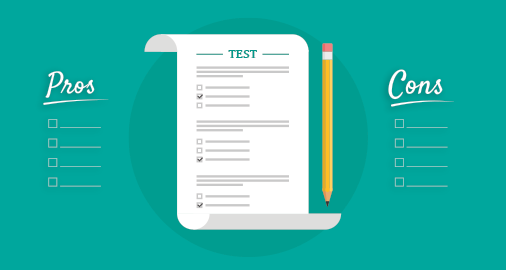Pre-employment testing: pros and cons
Pre-employment testing can predict the quality of hire under certain conditions. These tests should be legal, job-related, and well-validated. They add objectivity to the recruiting process, but they should be used in conjunction with other assessment methods. Despite making the hiring process longer, they can lead to better hiring decisions.

It’s been more than 50 years since companies started using pre-employment testing. Despite some indication that personality is little related to job performance, personality tests are a multi-million dollar industry. Companies also use other types of tests like cognitive ability tests and skills assessments which have helped companies retain new hires.
All tests have their merits but they are far from perfect. To help you decide whether to include them in your recruiting process, we’ve put together an overview of pros and cons:
Contents
The positive side
Tests are more objective than other forms of assessment
Unstructured interviews, resume screenings and pre-interview calls are ineffective predictors of job performance. This is because recruiters and hiring managers often judge candidates based on subjective, rather than job-related, criteria.
Tests work differently. If they’re well-designed, they can help you draw more objective conclusions. Well-designed tests are valid (they measure what they are designed to measure) and reliable (they produce consistent results).
Tests are the same for everyone
Other assessment methods like screening calls and unstructured interviews can be unfair. Interviewers ask different questions to different candidates and there’s no consensus on how to rate candidates’ answers.
Tests, by contrast, are standardized and administered in the same way to all candidates. If they’re crafted according to strictly job-related criteria, they give everyone the same opportunity to succeed.
Tests can save you time on interviews
Assessing 20 traits during an interview would be time consuming and exhausting for both candidates and interviewers. You can assess some of these traits through pre-employment testing instead.
It’s best to assess job knowledge through tests to avoid losing time interviewing candidates who can’t do the job. You can also evaluate certain skills through tests like typing speed, written communication or problem-solving.
Tests allow you to rely on quantifiable insight
Sometimes experienced hiring managers have a gut feeling about certain candidates. Unfortunately, this gut feeling isn’t always a good ally. It might lead them to the wrong conclusions if it takes the form of unconscious bias. It’s also not legally defensible. If candidates’ decide to file a lawsuit for discriminatory hiring practices, companies will have difficulty defending their hiring managers’ vague assumptions.
Tests, much like structured interviews, give you something tangible to guide your hiring decisions. They help you to be specific about your reasons for rejecting candidates, instead of relying solely on intuition.
Tests can be strictly job related
Unless you’re using structured interviews, it’s easy to stray from job-related criteria when interviewing candidates. But, tests can be designed to focus solely on what really matters for the job.
That depends on the type of test, though. One of the most popular personality tests, the Myers-Briggs test, is unable to predict job performance (or personality, for that matter). It’s best for companies to avoid it. Other tests, like Gallup’s StrengthsFinder and 16PF, can be better options.
And the negative side
Tests rarely give the whole picture
Each test usually measures a handful of traits. This means that they neglect to assess important details. For example, job knowledge tests are good at assessing job specific knowledge. But, they don’t take into account how willing (or able) someone is to learn and improve. Candidates might have never used CRM systems before but they could learn quickly. Other candidates might have deep knowledge of such systems but could be unwilling to try new technologies. Test results alone won’t necessarily tell you who’d be the best candidate for your company.
To assess more traits, you will have to use multiple tests. There’s a risk that this will annoy or exhaust candidates. They might stop trying to give honest or thoughtful answers if they’re tired of taking copious amounts of tests.
Tests can be discriminatory
This seems to be a paradox, since tests are relatively objective. But cognitive ability and knowledge tests can disproportionately screen out non-white candidates. This can result in costly lawsuits. One example is a 2012 discrimination case where a company had to pay $550,000 in back wages to minority workers it rejected through a pre-employment test.
Some personality and physical ability tests can break anti-discrimination laws, if they’re trying to ‘diagnose’ a mental or physical condition that’s unrelated to the job. For example, in 2006, the Equal Employment Opportunity Commission (EEOC), won a lawsuit against a company that screened out female applicants through a ‘strength’ test.
Tests invite lies
Drug tests can’t be easily faked but that’s not necessarily true for all tests. For example, if you ask candidates to complete an integrity and work ethics test, then you can expect candidates to occasionally fake their answers. This doesn’t always happen consciously. People tend to present themselves in the best possible light (called social desirability bias). We all do it. And we’re more likely to misrepresent ourselves when a job is at stake. For example, extraversion is usually highly valued in the workplace. If a personality test asks candidates to rate their social skills, you can expect that few candidates, if any, will rate themselves as anti-social.
Tests (and their results) are often ambiguous
Integrity tests are a good example. You might have come across one that asks you to indicate whether you agree or disagree with statements like “morality is important.” But how can you be sure there will be consensus among candidates on what this sentence means? Some people might think it means treating others fairly. But others might associate morality with religion. This kind of ambiguity can give you unreliable results.
Tests result in longer time-to-fill
Giving one 20-minute test to all shortlisted candidates can slow down your recruitment process by several days. If you add various types of tests and an assignment (which is generally a good idea), prepare yourself for a lengthy process. It’s still worth it though, since tests can improve quality of hire.
Tests assume unique people are made through molds
People have many things in common. But, there are also many things that make us different. Tests can’t capture this variation. They assume we all respond the same way to situations and statements.
Companies usually look for culture fit and tests can help them hire people made from the same mold. But, this approach doesn’t always work. It might be more beneficial for companies to hire people who complement their culture. Or people who have unique abilities and views. Diverse teams produce better results, after all.
So, should pre-employment testing be part of a recruiting process?
Pre-employment testing can help to predict quality of hire, under some conditions. Here are the three most important:
- Tests should be legal. Discriminatory tests can damage companies. There are ways to monitor tests’ outcomes. For example, you can calculate the yield ratios of the testing phase. If you find that you disproportionately reject protected groups, you should stop using the test. Also, if you want to use pre-employment drug screening, you should know about any relevant legal guidelines.
- Tests should be job-related. Questions should measure strictly job-related traits that companies have identified through job analysis. It’s best to assess only the ‘must-haves’ for a position. It’s also best to use separate tests for unrelated positions. It wouldn’t make much sense to test office clerks using a case study for sales representatives.
- Tests should be well-validated. The law doesn’t prohibit companies from using tests that hiring managers make up on the spot (as long as they’re not discriminatory). But, tests are only worth the trouble if they can actually predict job performance.
The bottom line
Using well-designed pre-employment tests can add objectivity to your recruiting process. But, it’s still reasonable to be skeptical of them. Tests are created and completed by people after all, so they’re unlikely to ever be really free of biases or misunderstandings.
There will always be false positives and false negatives. It’s best to use pre-employment tests in conjunction with other assessment methods. And it’s best to choose tests that researchers have checked for validity and reliability. They make for a longer hiring process, but they can result in better hiring decisions.
Frequently asked questions
- What are pre-employment tests?
- Pre-employment testing is a standardized method to test job candidates on their qualifications for a job during the recruitment process. These can range from tests for standard job skills and knowledge of software to emotional integrity and cognitive ability.
- How are pre-employment tests used by employers?
- Employers give pre-employment tests to see if your skills match the requirements within the job description. For example, if an employer is hiring for a copywriter position, they might administer a writing test to find out if your skills match their expectations.
- What reasons would cause you to fail a pre-employment physical?
- Failing a pre-employment physical or HPE (Human Performance Evaluation) can happen for a number of reasons, though often failing a drug or alcohol test can be the reason a candidate does not pass. This is particularly common for jobs involving driving or operating heavy machinery where sobriety is of paramount importance.




